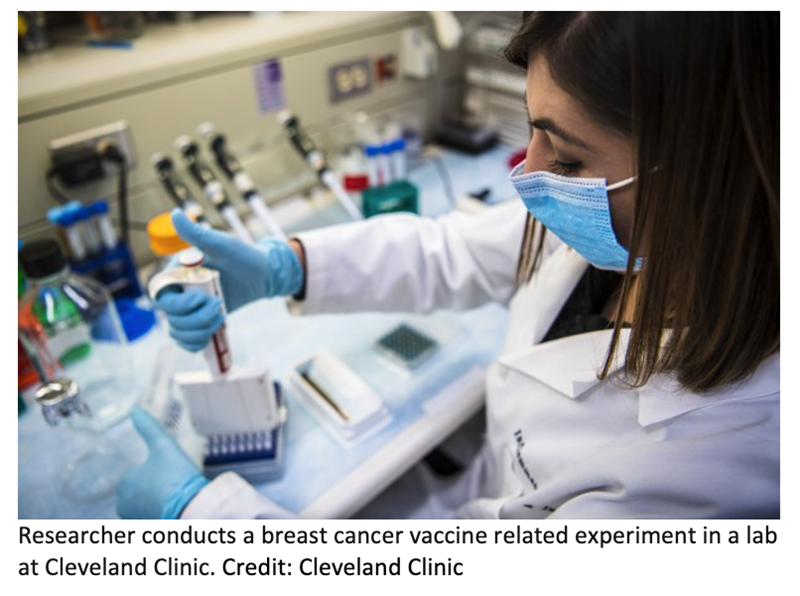Triple-Negative Breast Cancer Vaccine Enters Next Phase at Cleveland Clinic
 Funded by the US Department of Defense, the Cleveland Clinic’s new phase 1b study of a vaccine aimed at preventing triple-negative breast cancer will enroll cancer-free individuals at high risk for developing breast cancer who have decided to voluntarily undergo prophylactic mastectomy to lower their risk.
Funded by the US Department of Defense, the Cleveland Clinic’s new phase 1b study of a vaccine aimed at preventing triple-negative breast cancer will enroll cancer-free individuals at high risk for developing breast cancer who have decided to voluntarily undergo prophylactic mastectomy to lower their risk.
Individuals in that category typically carry genetic mutations that put them at risk of developing triple-negative breast cancer or have high familial risk for any breast cancer. The study, conducted at Cleveland Clinic’s main campus, will evaluate safety and monitor immune response.
The new study will include approximately 6-12 patients and is anticipated to be complete by the end of 2023. Study participants will receive three vaccinations given two weeks apart and will be closely monitored for side effects and immune response.
The phase 1b clinical trial, conducted in partnership with Anixa Biosciences, Inc, follows the ongoing phase 1a study, which opened in 2021 and is expected to be complete in the 4th quarter of 2023. The phase 1a trial includes patients who completed treatment for early-stage, triple-negative breast cancer within the past three years and are currently tumor-free but at high risk for recurrence.
“Triple-negative breast cancer is the form of the disease for which we have the least effective treatments,” said G Thomas Budd, MD, of Cleveland Clinic’s Taussig Cancer Institute and principal investigator of the study. “Long term, we are hoping that this can be a true preventive vaccine that would be administered to cancer-free individuals to prevent them from developing this highly aggressive disease.”
According to Dr Budd, there is a great need for improved treatments for triple-negative breast cancer, which does not have biological characteristics that typically respond to hormonal or targeted therapies. Despite representing only about 12% to 15% of all breast cancers, triple-negative breast cancer accounts for a disproportionately higher percentage of breast cancer deaths. It is twice as likely to occur in Black women, and approximately 70 to 80% of the breast tumors that occur in women with mutations in the BRCA1 gene are triple-negative breast cancer.
The vaccine is based on pre-clinical research led by the late Vincent Tuohy, PhD, who was the Mort and Iris November Distinguished Chair in Innovative Breast Cancer Research at Cleveland Clinic's Lerner Research Institute. Dr Tuohy was an outstanding and passionate scientist and his decades of groundbreaking research led to the development of this investigational vaccine.
The vaccine targets a lactation protein, α-lactalbumin, which is no longer found after lactation in normal, aging tissues but is present in the majority of triple-negative breast cancers. If breast cancer develops, the vaccine is designed to prompt the immune system to attack the tumor and keep it from growing.
The study is based on Dr Tuohy’s research that showed that activating the immune system against α-lactalbumin was safe and effective in preventing breast tumors in mice. The research, originally published in Nature Medicine, was funded in part by philanthropic gifts from more than 20,000 people over the last 12 years.
“It was Dr Tuohy’s hope that this vaccine would demonstrate the potential of immunization as a new way to control breast cancer, and that a similar approach could someday be applied to other types of malignancy,” added Dr Budd.